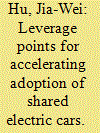|
|
|
Sort Order |
|
|
|
Items / Page
|
|
|
|
|
|
|
| Srl | Item |
| 1 |
ID:
180132


|
|
|
|
|
| Summary/Abstract |
New Energy Vehicles (NEVs), and especially electric cars, are rapidly changing the outlook of the car industry in China, the largest vehicle market in the world. However, an adjustment in subsidy schemes and breakout of COVID-19 appear to slow down the uptake of NEVs in the Chinese market. This raises the question of whether, other less costly, policy instruments can help the transformation towards cleaner vehicles. With the understanding that public support and user acceptance play a key role, we ask whether NEVs as part of increasingly popular car-sharing mode can gain further support, the increased uptake of new energy vehicles. To investigate this question, we perform an online survey, retrieving 1583 questionnaires, and scrutinize the perception of NEVs at the nexus with car-sharing. Relying on the Theory of Planned Behavior and ordered logistic regression model, we demonstrate that attitudes towards environmental protection and perceived benefits (economic and safety) play a key role in accelerating the adoption of shared electric cars. NEVs promotion policies need to specifically target groups by regions. Municipal agencies can substantially support NEV uptake by providing on-street parking exclusively for shared NEVs in cities, and information on the economic and social benefits of NEVs in rural areas.
|
|
|
|
|
|
|
|
|
|
|
|
|
|
|
|
| 2 |
ID:
149876


|
|
|
|
|
| Summary/Abstract |
Despite evidence that a rising number of municipalities in Germany are striving for energy self-sufficiency, there is little understanding of the driving factors behind this development. We investigate economic, ecological, social and energy system related factors that drive municipalities to strive for energy self-sufficiency with a focus on electricity supply. The empirical data for this study is based on insights generated through expert interviews (N =19) with mayors, energy experts and scientists as well as a quantitative study among mayors and energy officers (N =109) of German municipalities. Results show that environmental awareness, tax revenues and greater independence from private utilities are positively related to the mayors’ attitude towards the realization of energy self-sufficiency. Furthermore, citizens, the political environment, the mayor's political power, and his/her financial resources are relevant factors for a municipality striving for energy self-sufficiency. Policymakers need to decide whether or not to support mayors in this development. For suitable policy interventions, the results suggest the importance of an integrated approach that considers a combination of identified factors. Finally, we propose a morphological box to structure different aspects of energy self-sufficiency and categorize the present study.
|
|
|
|
|
|
|
|
|
|
|
|
|
|
|
|
| 3 |
ID:
183055


|
|
|
|
|
| Summary/Abstract |
Electricity theft is a challenge for developing countries including Ghana. Given its detrimental impacts on utility companies’ fiscal outlook and investment attractiveness, countervailing measures have been instituted. However, these have yielded suboptimal outcomes and thus excited whistleblowing discourses. Therefore, the current study engages a behavior paradigm to probe individual electricity theft whistleblowing intention behavior. With 471 responses, the results from structural equation modelling affirmed a positive relationship between awareness of consequences and attitude. Also, a positive relationship between awareness of consequences and subjective norm was confirmed. Moreover, whereas the positive relationship between subjective norm and attitude was verified, the positive relationships between perceived behavior control and personal norm was established. Attitude was also certified to be positively related to whistleblowing intention. In addition, perceived behavior control and personal norm were confirmed to be positively related to intention. Ascription of consequences was also revealed to be significantly related to personal norm. Similarly, ascription of responsibility was confirmed to moderate the relationships between attitude and intention, and personal norm and intention. In addition to demonstrating the appropriateness, applicability and efficacy of the proposed model in predicting electricity theft whistleblowing intention, the study outcomes form grounds for instituting anti-theft policy interventions.
|
|
|
|
|
|
|
|
|
|
|
|
|
|
|
|
|
|
|
|
|